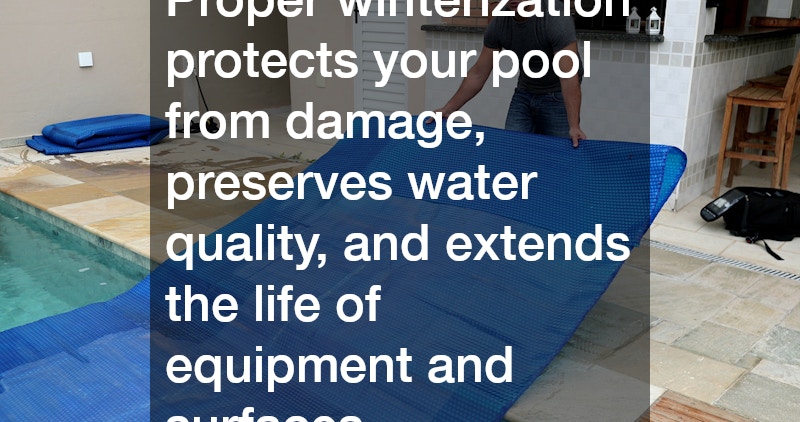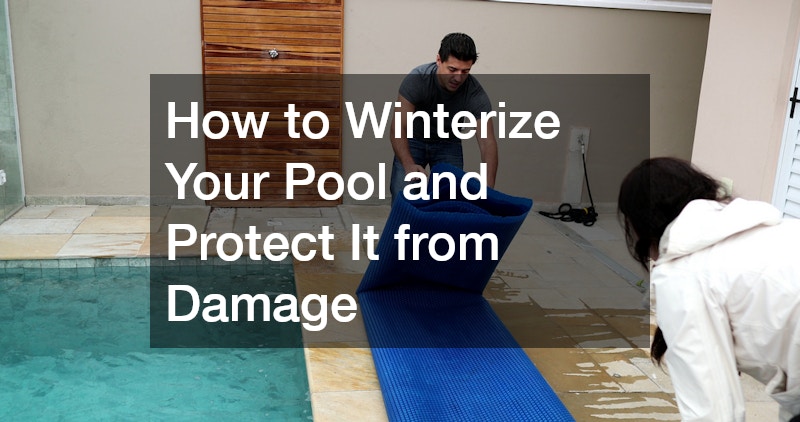
As the swimming season comes to a close, properly winterizing your pool is essential to protect it from damage. Pools that are not correctly prepared for colder months can develop costly issues, including damaged equipment, stained surfaces, and unsafe water conditions. Taking the right steps to winterize your pool ensures it remains in top condition and is ready for use when warmer weather returns. Many homeowners rely on the expertise of pool cleaning businesses to handle this process, ensuring every detail is addressed and the pool stays safe and functional throughout the off-season. Winterizing a pool is not just about protecting the water; it is also about safeguarding your investment and preventing headaches when it’s time to reopen.
Preparing Your Pool for Winter
The first step in winterizing a pool is a comprehensive cleaning. Debris, algae, and dirt left in the water can lead to staining, clog filters, or create chemical imbalances during the off-season. Skimming the surface, brushing the walls, and vacuuming the pool floor are critical steps to ensure no buildup remains. Draining water from skimmers, pumps, and filters is also essential to prevent freezing and damage to plumbing. Many homeowners choose to work with pool cleaning businesses during this stage to ensure that every aspect of the pool is properly cleaned and prepped. Professional assistance helps prevent common mistakes and provides peace of mind, knowing the pool is ready to withstand the winter months. Thorough preparation at this stage reduces the risk of costly repairs and sets the foundation for effective chemical treatment.
Maintaining Proper Water Chemistry
Maintaining water chemistry is critical for protecting the pool during winter. Imbalanced water can lead to algae growth, staining, or scaling, which can damage both the surface and the equipment. It’s important to test the pool’s pH, alkalinity, and calcium hardness and adjust levels to recommended ranges. Winterizing chemical kits are often used to provide long-term protection for the water while the pool is unused. Homeowners who want to ensure that chemical levels are properly managed often consult pool cleaning businesses for guidance. These professionals can recommend the right chemical treatments and ensure water conditions are optimal, protecting the pool’s surfaces and equipment while it sits idle for several months. Properly balanced water saves time and money in the spring and reduces the need for additional chemical adjustments when reopening.
Protecting Pool Equipment
Pool equipment such as pumps, filters, heaters, and plumbing is particularly vulnerable during winter. If water is left inside, freezing temperatures can cause pipes to burst and equipment to fail, leading to expensive repairs. Winterizing equipment includes draining water from all lines and covering sensitive components to shield them from cold and debris. Many homeowners rely on pool cleaning businesses to ensure that pumps, heaters, and other equipment are fully protected. Protecting these components is crucial to preserving the pool’s infrastructure and minimizing repair costs, ensuring the system remains operational and ready for use when the swimming season resumes. Professional winterization of equipment often includes specific techniques that prevent ice damage and prolong the lifespan of the pool system.
Covering the Pool
A properly installed pool cover is one of the most effective ways to safeguard a pool during winter. Covers prevent debris accumulation, reduce algae growth, and help maintain water levels. Before covering the pool, any remaining debris should be removed, and the pool edges should be thoroughly cleaned. Weighted or anchored covers are recommended because they remain secure during strong winds or heavy rainfall. Homeowners frequently consult pool cleaning businesses to determine the best cover options and to ensure the cover is properly installed. A secure cover not only protects the pool but also reduces the amount of cleaning and maintenance required in the spring, making it easier to reopen the pool safely and efficiently.
Regular Monitoring During Winter
Winterizing a pool does not mean it should be completely forgotten until spring. Periodic monitoring is important to prevent ice damage, maintain appropriate water levels, and ensure the pool cover remains in good condition. Debris should be removed from the cover, and any signs of wear or sagging should be addressed promptly. Seasonal inspections by professionals help prevent minor issues from escalating into costly repairs. Many homeowners choose to schedule check-ins with pool cleaning businesses to confirm that their pools remain in good condition throughout winter. Regular attention ensures both water quality and the structural integrity of the pool, providing confidence that the pool will be safe, clean, and ready when the next swimming season begins.
Proper winterization protects your pool from damage, preserves water quality, and extends the life of equipment and surfaces. By thoroughly cleaning the pool, maintaining water chemistry, protecting equipment, using a secure cover, and monitoring conditions during winter, homeowners can prevent costly repairs and enjoy a smooth reopening in spring. Partnering with professional pool cleaning businesses ensures that each step is handled correctly and your investment remains protected throughout the off-season. Taking the time to winterize your pool now provides peace of mind, reduces maintenance headaches, and guarantees that your pool will be ready for safe and enjoyable use year after year.




